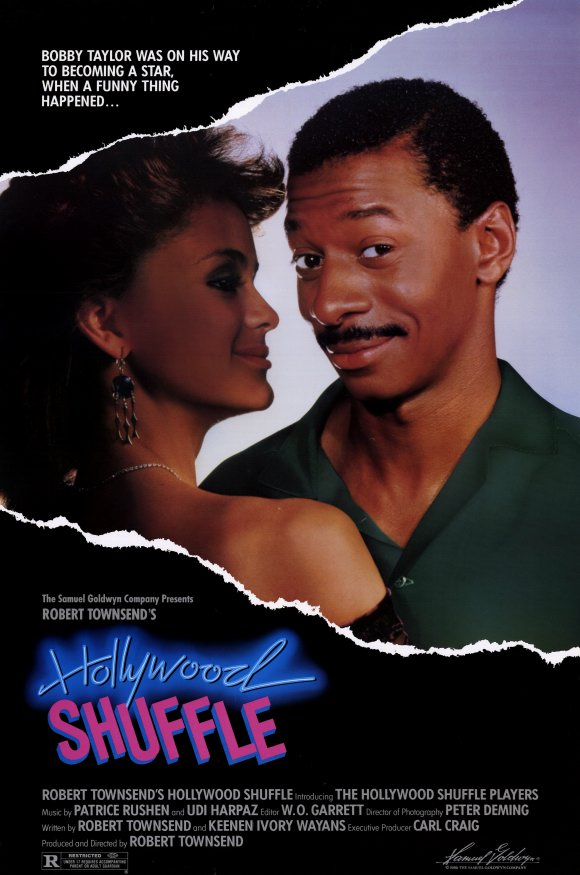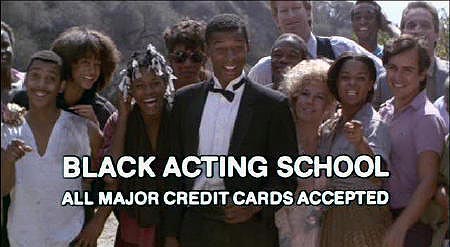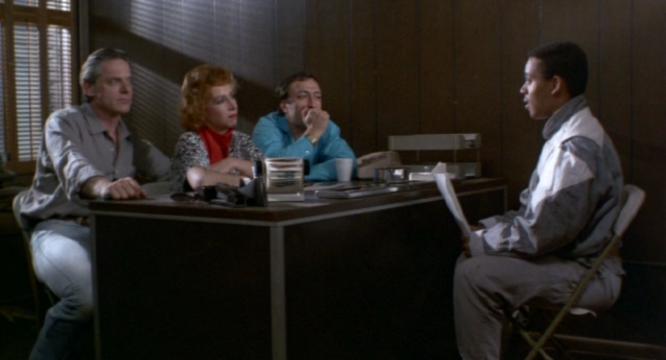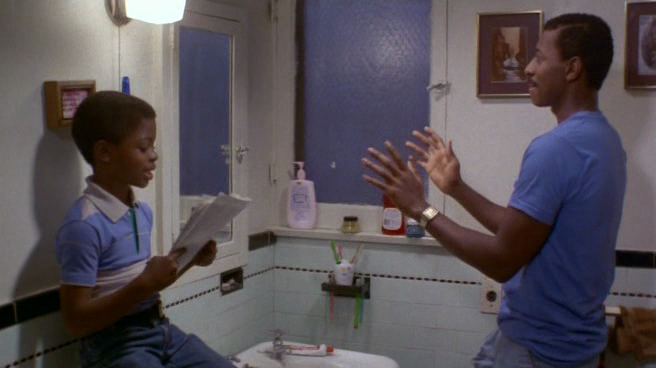Diversity and representation have long been a serious issue in the film industry, and 12 Years A Slave winning some Oscars hasn’t exactly changed that. Outside of that prestigious anomaly, people rarely imagine black film to be much more than gangster movies, cookout comedies, and Tyler Perry. Our very own Dominic Griffin will prove otherwise, shedding a light on unsung, underrated, forgotten and new films that show the breadth and versatility of the black voice in film. Named after one of Billy Dee Williams’ affectionate nicknames, this is Dark Gable Presents…

The cut paper motif. The neon logo. This poster is #80sasfuck. (Source)
When deciding on an inaugural film to tackle for this new biweekly column, I was incredibly angry at myself for not settling on Hollywood Shuffle sooner. It’d been some years since I first saw it (probably on IFC), but upon a recent viewing, I am amazed it doesn’t come up more in conversations about representation in the media and the state of independent film. A satirical comedy that exists somewhere between Kentucky Fried Movie and Annie Hall in terms of style and structure, Hollywood Shuffle follows Robert Townsend as Bobby Taylor, an authorial stand-in who struggles as a black actor. The film flits between the simple, relatable narrative of Bobby going on auditions, working a dead-end job (at infamous hot dog stand Winky Dinky Dog) and navigating his family and romantic lives, while interspersing timely and hilarious parody sequences. Co-writer/director/star Townsend financed much of the film’s $100,000 budget himself on credit cards, a gamble that paid off, but also illuminates the powerful need behind the inception of this project.
Presaging the In Living Color phenomenon (spearheaded by co-writer/star Keenan Ivory Wayans), Hollywood Shuffle is also probably a pretty big influence on Chappelle’s Show. I say probably because No One Knows What Lurks In Dave’s Mind, but the mixture of absurd comedy (an early sequence with a commercial for Black Acting School, where a white man teaches black men how to be “street”) and tragic realism (no, seriously, it’s a white dude painstakingly explaining jive talk to a grown, black man so he can get work as an actor) will seem right at home to even casual fans of the popular sketch show.
When we meet Bobby, he’s practicing sides for a role in what sounds like a deplorably offensive pimp movie, where his principle line of dialogue is “I ain’t be gottin no weapon!” It seems pathetic and awful, especially juxtaposed with the earnestly shot credits sequence. In the credits sequence, Bobby checks in on his family (he lives with his mother, grandmother, and younger brother), including his uncle, who used to be an actor, and his girlfriend, before “faking sick” with his boss to get out of a work (an early, indelible appearance from Friday‘s John Witherspoon). Once he arrives at the audition, he is greeted by a room full of black actors, male and female, light and dark, all reciting equally horrendous dialogue in hopes of joining the film’s cast.
He is met by a trifecta of Hollywood types (Eugene Glazer as the director, Dom Irrera as the writer, and Lisa Mende as the ridiculous casting director) who blow through a montage of black actors, some Shakespearean, who are forced to “act black” to make it into a film called Jivetime Jimmy’s Revenge. Bobby gets a callback, but is told they need him to be more of an Eddie Murphy type (an especially stinging detail, as Townsend was passed up for a spot on SNL’s cast in favor of Murphy). Ultimately, he gets the part, but struggles the rest of the film with whether or not playing a cartoonish pimp and disgusting his family on screen is worth realizing his dream of being in movies.
What I love about Hollywood Shuffle is how Bobby’s struggle is handled, with an equal serving of reflective drama and suppressing laughter, which says a lot about humanity in general, but the black experience specifically. This isn’t some navel-gazing peek into the abyss of the way black performers are treated in the movie industry. It’s a brisk, efficient story, well told, that distracts you with over-the-top comedy while slowly painting a depressing picture of reality. A recurring motif in the film is Brad Sanders playing Batty Boy from the show There’s A Bat In My House. It is literally a grown-ass man in a bat costume saying “Batty, batty, batty” at this white family. It’s an extreme extrapolation of the kind of minstrelsy that takes place on television to this day. The actor makes an appearance at Winky Dinky Dog and Bobby meets him, asking him how he decides if a script is good. The actor responds, “Your character, does he die? If he doesn’t die, then it’s a good script.” This line is delivered with a sense of seriousness that is crippling. That’s how fucking low the bar is!
Bobby’s grandmother takes real exception to the role he accepts, and her open judgment of his decisions hangs over the film’s second half, the answer to Bobby’s moral dilemna slyly hidden throughout the first half. The sequences of blatant parody all seem pretty straightforward and fun, but as they begin to stack up, and each of the film’s very talented cast members each pull double or triple duty essaying small parts in a variety of styles and tones, they form a quilt of versatility. These scenes aren’t just for laughs. They’re an ongoing showcase throughout the story to beautifully undercut the small box black actors and filmmakers are often unceremoniously placed in. This culminates in a particularly amazing sequence in which Bobby and his girlfriend watch a TV movie called Sam Ace, a black-and-white film noir starring Bobby himself and other cast members. It forms an extended set piece mocking the conventions of detective stories while simultaneously highlighting the diversity of content missing from black film. Bobby playing a pimp wouldn’t be so detrimental to his community if his community had a wider array of depictions of themselves on screen. As Paul Mooney so eloquently says in a cameo:
“They’ll never play the Rambos until they stop playing the Sambos.”
Townsend is a revelation in the film. He has a distinct Everyman charm that is hard to deny, calling to mind early Woody Allen on-screen appearances, minus the nebbish neuroses. He’s a capable and affecting storyteller, and manages to easily transition from broad, on-the-nose humor (like the majesty of the Sneaking Into The Movies sequence, where he portrays a regular street dude critiquing mainstream films) to subtly realized drama (as in the way his relationship with his younger brother is portrayed). As much as the film is about Bobby wanting to be an actor, his brother’s presence is a constant reminder of why he wants to be an actor. He wants to tell great stories on the screen, but if all he is doing is playing a goofy white dude’s impression of a pimp, then what’s the point? Their screen time together is adorable and well executed, never once devolving into the cutesy garbage a lot of child actors go through. There’s a genuine love there that can’t be denied, and that is ultimately what informs Bobby’s decision in the film’s conclusion.
Robert Townsend and Keenan Ivory Wayans were both in their prime during the making of Hollywood Shuffle. Each went on to make some amazing films on their own, among them I’m Gonna Git You Sucka and The Five Heartbeats. For a little bit, Townsend was a legitimate force in film, enough so that a studio trusted him to make Meteor Man. Whatever your feelings on that film, it was pretty ahead of its time in 1993, and you can say whatever you want about where the Wayans clan is now, but Keenan is an impressive filmmaker and Lowdown Dirty Shame is one of my favorite movies of the 1990s.
Townsend seems to be absent from the film industry of late. The last movie of his I remember actually watching was Holiday Heart, a TV movie that features Ving Rhames in drag. It may sound corny, but it’s a powerful story that I was ashamed to have made so many easy jokes about before viewing. I hope he makes a triumphant return to directing. Hollywood Shuffle remains one of my personal favorite films, and its message of integrity is still relevant today.
If you have any films you would like to see covered in this column, hit us up on Twitter @DeadshirtDotNet and we’ll get them in front of Dom.




